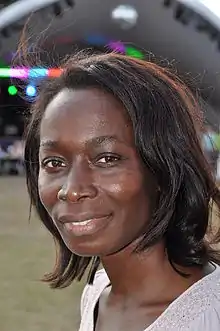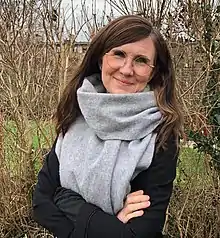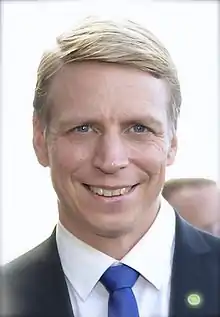2022 Swedish general election
General elections will be held in Sweden on 11 September 2022[N 1] to elect the 349 members of the Riksdag.[1] They in turn will elect the Prime Minister of Sweden.[lower-alpha 1] Under the constitution, regional and municipal elections will also be held on the same day.
| ||||||||||||||||||||||||||||||||||||||||||||||||||||||||||||||||||||||||||||||||||||||||||||||||||||||||||||
All 349 seats to the Riksdag 175 seats are needed for a majority | ||||||||||||||||||||||||||||||||||||||||||||||||||||||||||||||||||||||||||||||||||||||||||||||||||||||||||||
|---|---|---|---|---|---|---|---|---|---|---|---|---|---|---|---|---|---|---|---|---|---|---|---|---|---|---|---|---|---|---|---|---|---|---|---|---|---|---|---|---|---|---|---|---|---|---|---|---|---|---|---|---|---|---|---|---|---|---|---|---|---|---|---|---|---|---|---|---|---|---|---|---|---|---|---|---|---|---|---|---|---|---|---|---|---|---|---|---|---|---|---|---|---|---|---|---|---|---|---|---|---|---|---|---|---|---|---|---|
| Opinion polls | ||||||||||||||||||||||||||||||||||||||||||||||||||||||||||||||||||||||||||||||||||||||||||||||||||||||||||||
| ||||||||||||||||||||||||||||||||||||||||||||||||||||||||||||||||||||||||||||||||||||||||||||||||||||||||||||
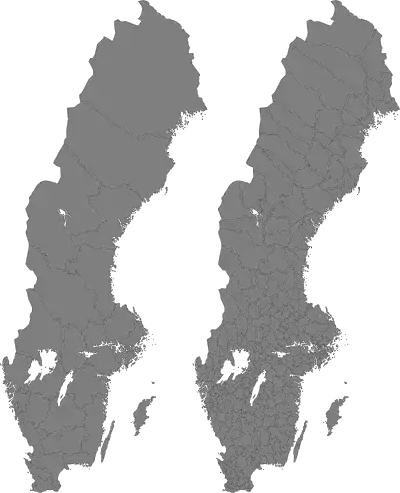 Largest party by district (left) and municipality (right) | ||||||||||||||||||||||||||||||||||||||||||||||||||||||||||||||||||||||||||||||||||||||||||||||||||||||||||||
| ||||||||||||||||||||||||||||||||||||||||||||||||||||||||||||||||||||||||||||||||||||||||||||||||||||||||||||
In Sweden, national (and regional/local) elections are part of a four-year cycle and will be held regardless as, should there be cause for snap elections, the regular quadrennial cycle remains uninterrupted.
Contesting parties
Parliamentary parties
The Social Democratic Party (S; Socialdemokraterna) is the largest political party in the Swedish Riksdag, with 100 of the 349 seats. It is the senior partner in the incumbent minority coalition Löfven Cabinet, governing with the Green Party. Its current leader Stefan Löfven has been Prime Minister of Sweden since 2014, being re-elected in 2018.
The Moderate Party (M; Moderaterna) is the second-largest party in the Riksdag with 70 seats. It last governed under Prime Minister Fredrik Reinfeldt, from 2006 until 2014. The party used to be the leading member of the defunct Alliance. Its current leader, Ulf Kristersson, was tasked with forming a government by speaker Andreas Norlén after the inconclusive 2018 election. However, he failed to do so after the Centre Party and the Liberals, his former partners in the Alliance, refused to co-operate with SD in order to make him prime minister.
The Sweden Democrats (SD; Sverigedemokraterna) is the third-largest party in the Riksdag with 62 seats. Until 2018, all other parties represented in the Riksdag had repeatedly refused to co-operate with them due to their perceived extremism. Nevertheless, they voted with the Alliance parties to force a motion of no confidence against Prime Minister Löfven after the 2018 election and supported Ulf Kristersson as Prime Minister, urging fellow parties to form a "Conservative bloc" together with the Moderates and Christian Democrats.
The Centre Party (C; Centerpartiet) is the fourth-largest party in the Riksdag with 31 seats. It was represented in the Reinfeldt cabinet from 2006 to 2014, and is a member party of the Alliance. The Centre Party has been led by Annie Lööf since 2011. Prime Minister Löfven has repeatedly attempted to win the parliamentary support of the Centre Party, but the party traditionally leans towards the Moderate policy positions and stayed within the Alliance after the 2014 election. Following the 2018 election, the Centre Party has indicated that it may support the reinstatement of Löfven as prime minister, subject to concessions in certain political areas.
The Left Party (V; Vänsterpartiet) is the fifth-largest party in the Riksdag with 27 seats. Its current leader is Nooshi Dadgostar. The Left Party has traditionally supported all Social Democratic governments in parliament, but has never been part of the ruling coalition. The party won 28 seats in the 2018 election, but currently has 27 seats as Amineh Kakabaveh was expelled from her party while retaining her seat.
The Christian Democrats (KD; Kristdemokraterna) is the sixth-largest party in the Riksdag with 22 seats. It has been led by Ebba Busch since 2015. It is a member of the Alliance. Despite polling steadily below the 4% threshold for parliamentary representation during most of the interim between the elections, the party saw a resurgence in support immediately prior to the election, guaranteeing its representation in the Riksdag (which was seen as essential in order for the Alliance to be able to form a government).
The Liberals (L; Liberalerna) is the seventh-largest party in the Riksdag with 19 seats. It was represented in the Reinfeldt cabinet from 2006 to 2014, and is a member of the Alliance. The party has been led by Nyamko Sabuni since 2019. After the 2018 election the Liberals indicated that they might support the reinstatement of Löfven as prime minister, subject to concessions in certain political areas. The party won 20 seats in the 2018 election, but currently has 19 seats as Emma Carlsson Löfdahl resigned from her party while retaining her seat.
The Green Party (MP; Miljöpartiet) is the eighth-largest party in the Riksdag with 16 seats. The Green Party is the minor partner of the Löfven Cabinet, alongside the Social Democrats. It is the only Swedish party to have two spokespersons, currently Per Bolund (since 2019) who serves as Minister for Housing, and Märta Stenevi (since 2021) who serves as Minister for International Development Cooperation. The party, along with the rest of the Löfven cabinet, lost a vote of confidence in the Riksdag after the election. The Green Party has traditionally supported social democratic governments.
Minor parties
Parties with less than 4% of the vote are not represented in the Riksdag.
Feminist Initiative (FI; Feministiskt Initiativ) is the country's ninth-largest party, and was represented in the European Parliament from 2014 to 2019. The party received 0.46% of the vote in the 2018 general election, down from 3.12% in the 2014 election.
The Alternative for Sweden (Alternativ för Sverige), led by Gustav Kasselstrand, is the country's tenth-largest party. It was formed by members expelled from the Sweden Democrats after they cut ties with their former youth organization. The party was represented in the 2014-2018 Riksdag by a number of defectors who had originally been elected as Sweden Democrats, but the party failed to achieve representation after the 2018 election, receiving 0.31% of the vote.
Electoral system
The Swedish Riksdag is made up of 349 MPs, and all are elected through open list proportional representation on multi-member party lists that are either regional (most major parties) or national (Sweden Democrats). Each of the 29 constituencies has a set number of parliamentarians that is divided through constituency results to ensure regional representation. The other MPs are then elected through a proportional balancing, to ensure that the numbers of elected MPs for the various parties accurately represent the votes of the electorate. The Swedish constitution (Regeringsformen) 1 Ch. 4 § says that the Riksdag is responsible for taxation and making laws, and 1 Ch. 6 § says that the government is held responsible to the Riksdag. This means that Sweden has parliamentarism in a constitutional monarchy—ensuring that the government is responsible to the people's representatives. A minimum of 4% of the national vote (or, alternatively, 12% or more within a constituency) is required for a party to enter the Riksdag. Were the latter to occur, the party only gains representation within that constituency's seat share.
Vote secrecy and party-specific ballots
In Swedish elections, voters may openly pick up several party-specific ballots, and then, in the voting booth, mark the ballot they chose. Two election observers of the Organization for Security and Co-operation in Europe (OSCE) present at the 2018 general election criticized this system, saying that it could endanger ballot secrecy, and that they would look into the issue in the report that was to be published eight weeks later.[2]
Election officials are responsible for party-specific ballot papers being present in the voting places for parties that have obtained more than one percent of the votes in the previous parliamentary election.[3] A voter may write in the party name of choice on a blank ballot paper to cast a vote if there is no access to the desired party-specific ballot paper.[4]
Parties
The table below lists parties currently represented in the Riksdag.
| Name | Ideologies | Leader | 2018 result | |||
|---|---|---|---|---|---|---|
| Votes (%) | Seats | |||||
| S | Swedish Social Democratic Party Socialdemokraterna |
Social democracy | Stefan Löfven | 28.26% | 100 / 349 | |
| M | Moderate Party Moderaterna |
Liberal conservatism | Ulf Kristersson | 19.84% | 70 / 349 | |
| SD | Sweden Democrats Sverigedemokraterna |
Right-wing populism National conservatism |
Jimmie Åkesson | 17.53% | 62 / 349 | |
| C | Centre Party Centerpartiet |
Liberalism Agrarianism |
Annie Lööf | 8.61% | 31 / 349 | |
| V | Left Party Vänsterpartiet |
Socialism Feminism |
Nooshi Dadgostar | 8.00% | 28 / 349 | |
| KD | Christian Democrats Kristdemokraterna |
Christian democracy | Ebba Busch | 6.32% | 22 / 349 | |
| L | Liberals Liberalerna |
Liberalism | Nyamko Sabuni | 5.49% | 20 / 349 | |
| MP | Green Party Miljöpartiet |
Green politics | Märta Stenevi Per Bolund |
4.41% | 16 / 349 | |
Opinion polls
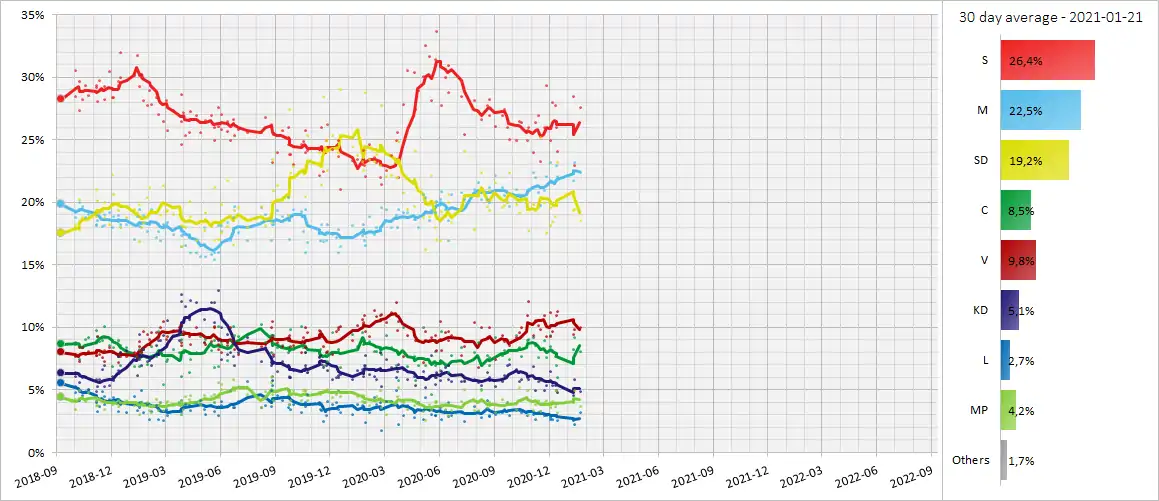
Notes
- In accordance with Swedish electoral law, a snap election occurring in the interim would not result in a rescheduling of the 2022 scheduled general election.
References
- "The Swedish electoral system". www.val.se. Retrieved 13 September 2018.
- Bolling, Anders (9 September 2018). "Utländska observatörer granskar valsedlar som ligger öppet". Dagens Nyheter (in Swedish). Retrieved 10 September 2018.
- "Putting out ballot papers". Valmyndigheten. 20 April 2018. Retrieved 10 September 2018.
- "Ballot papers". Valmyndigheten. 17 August 2018. Retrieved 10 September 2018.
_(cropped).jpg.webp)
_(cropped).jpg.webp)
.jpg.webp)
.jpg.webp)
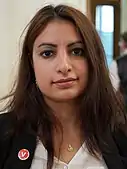
_(cropped).jpg.webp)
